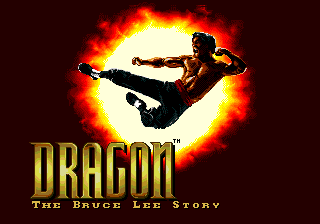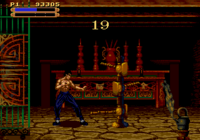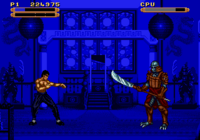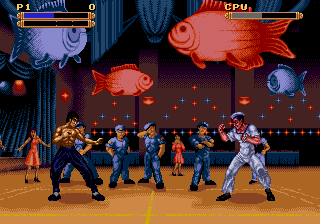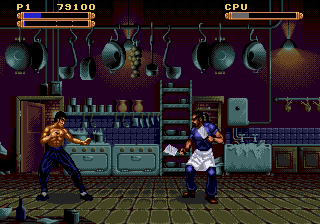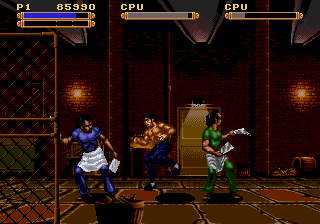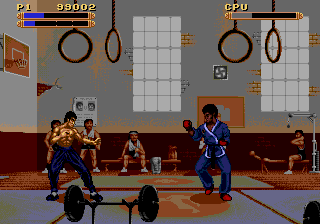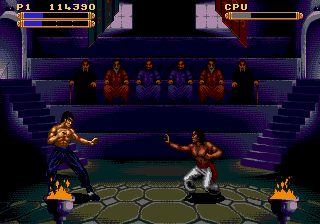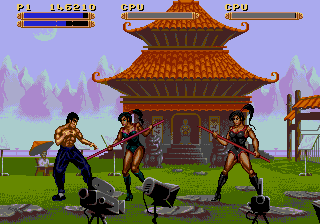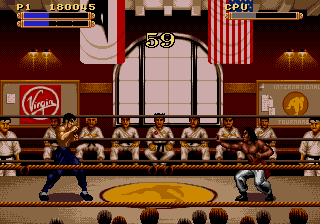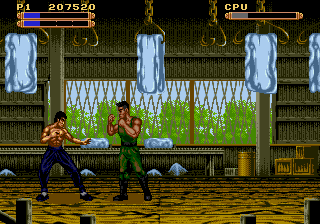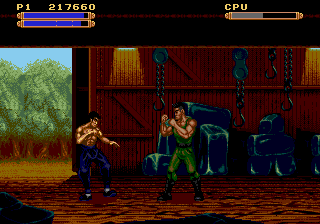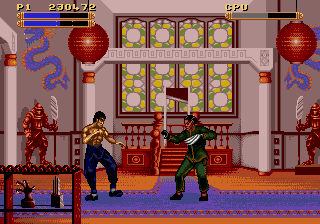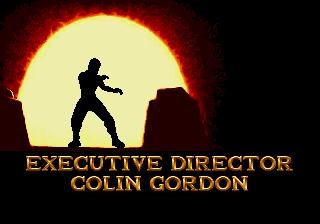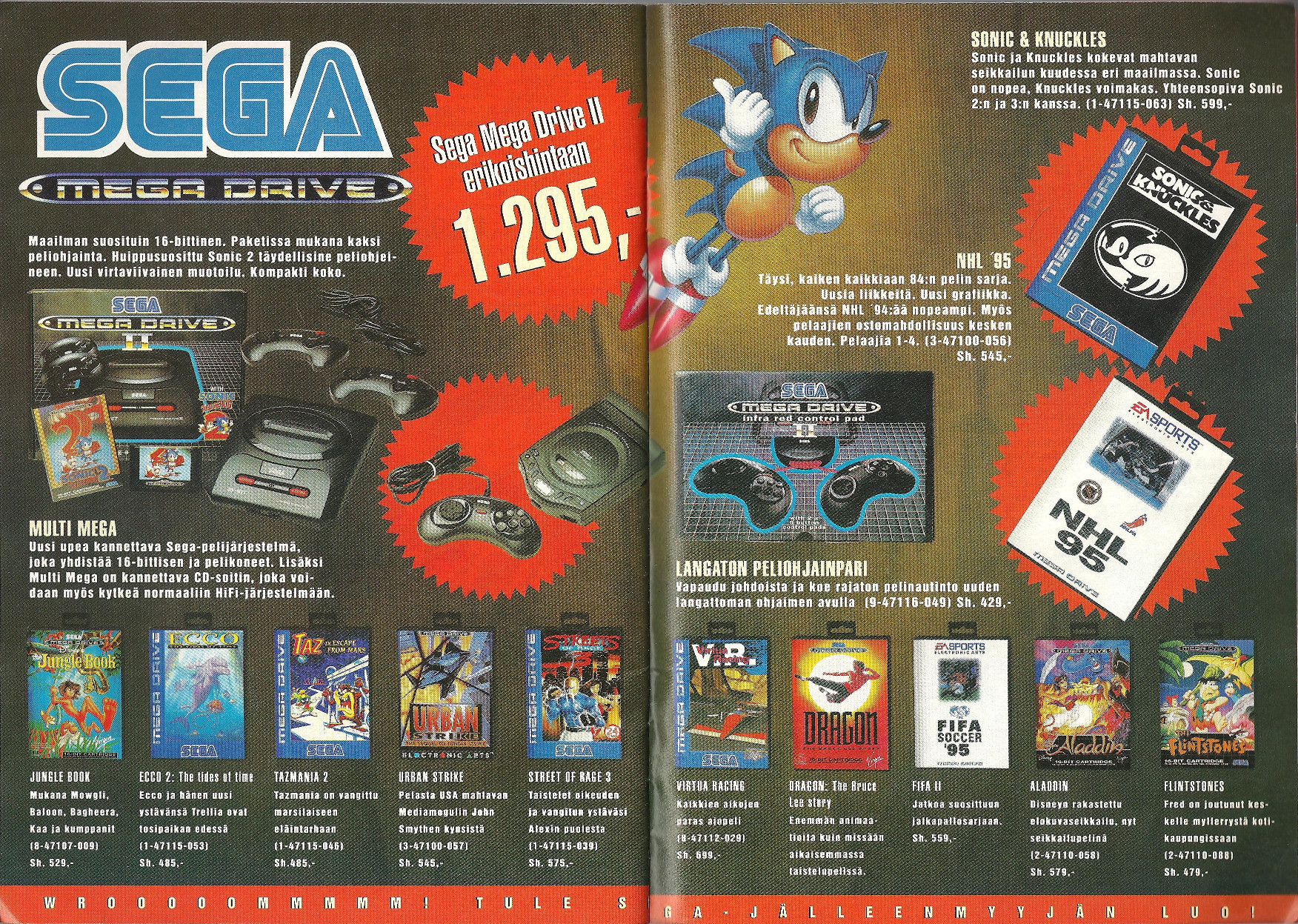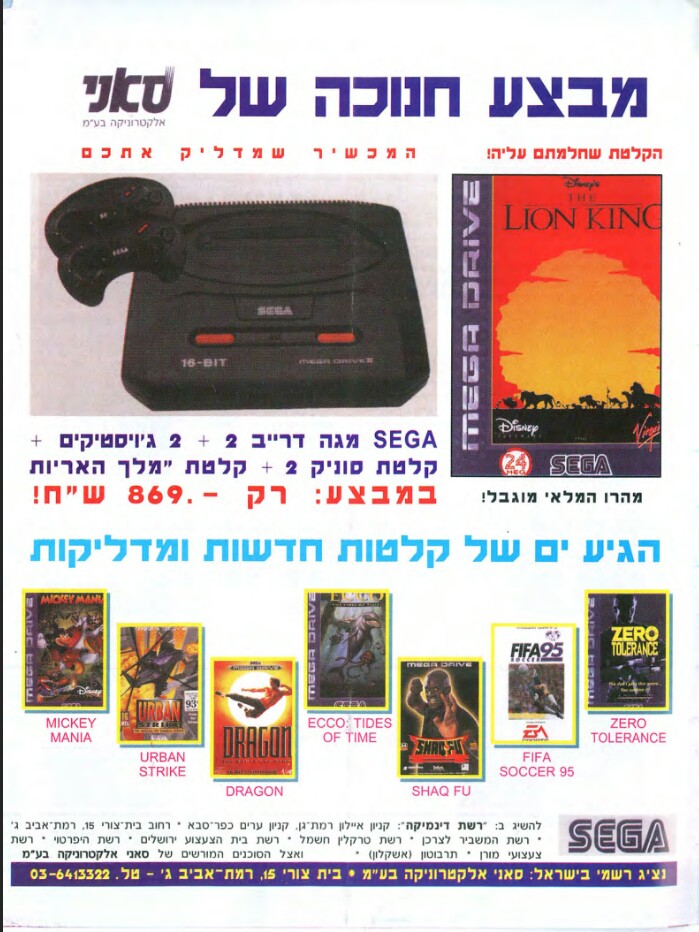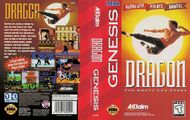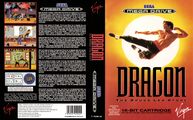Difference between revisions of "Dragon: The Bruce Lee Story"
From Sega Retro
m |
|||
| Line 2: | Line 2: | ||
{{Bob | {{Bob | ||
| bobscreen=DragonTheBruceLeeStory title.png | | bobscreen=DragonTheBruceLeeStory title.png | ||
| − | | publisher={{company|[[Acclaim Entertainment]]|region=US}}, {{company|[[Virgin Interactive Entertainment]]|region=Europe}} | + | | publisher={{company|[[Acclaim Entertainment]]|region=US}}, {{company|[[Virgin Interactive Entertainment]]|region=Europe}}, {{company|[[SF Interactive Media]]|region=SE rental}} |
| developer=[[Acclaim Entertainment]] | | developer=[[Acclaim Entertainment]] | ||
| licensor=[[Universal City Studios]] | | licensor=[[Universal City Studios]] | ||
Revision as of 03:24, 18 September 2023
- For the Sega Master System and Sega Game Gear versions, see Dragon: The Bruce Lee Story (8-bit).
| Dragon: The Bruce Lee Story | |||||||||||||||||||||||||||||||||||||||||||||
|---|---|---|---|---|---|---|---|---|---|---|---|---|---|---|---|---|---|---|---|---|---|---|---|---|---|---|---|---|---|---|---|---|---|---|---|---|---|---|---|---|---|---|---|---|---|
| System(s): Sega Mega Drive | |||||||||||||||||||||||||||||||||||||||||||||
| Publisher: Acclaim Entertainment (US), Virgin Interactive Entertainment (Europe), SF Interactive Media (SE rental) | |||||||||||||||||||||||||||||||||||||||||||||
| Developer: Acclaim Entertainment | |||||||||||||||||||||||||||||||||||||||||||||
| Licensor: Universal City Studios | |||||||||||||||||||||||||||||||||||||||||||||
| Sound driver: GEMS | |||||||||||||||||||||||||||||||||||||||||||||
| Peripherals supported: Six Button Control Pad, Team Player | |||||||||||||||||||||||||||||||||||||||||||||
| Genre: Action | |||||||||||||||||||||||||||||||||||||||||||||
| Number of players: 1-3 | |||||||||||||||||||||||||||||||||||||||||||||
| |||||||||||||||||||||||||||||||||||||||||||||
|
Dragon: The Bruce Lee Story is a Sega Mega Drive versus fighting game based on the 1993 film Dragon: The Bruce Lee Story.
Contents
Story
The game follows the events of the film, a semi-fictionalized account of the life of renowned martial artist and actor Bruce Lee.
Gameplay
The game is a versus fighting game where the life story of Bruce Lee is told through several fight scenes in different locations and time periods. Bruce uses a variety of martial arts moves to defeat his opponents in a manner similar to fighting games such as Street Fighter. Fights are usually one-on-one, though Bruce occasionally fights two opponents at once. The game supports up to three simultaneous players, though Bruce Lee is the only playable character, even in the multiplayer modes.
Bruce moves with ![]() or
or ![]() , crouches with
, crouches with ![]() , and jumps with
, and jumps with ![]() . He flips with
. He flips with ![]() or
or ![]() , which can pass through opponents and evade attacks. He punches with
, which can pass through opponents and evade attacks. He punches with ![]() (fast) or
(fast) or ![]() (hard) and kicks with
(hard) and kicks with ![]() (fast) or
(fast) or ![]() (hard). When using a standard three-button control pad, he performs a fast kick with
(hard). When using a standard three-button control pad, he performs a fast kick with ![]() , a fast punch with
, a fast punch with ![]() , and a hard kick or punch with
, and a hard kick or punch with ![]() (with START toggling between the two), and START +
(with START toggling between the two), and START +![]() +
+![]() +
+![]() pauses the game.
pauses the game.
Blocking is done by holding the D-Pad away from the opponent. He can throw a nearby opponent by pressing the D-Pad away from the opponent while pressing the fast punch button. While being thrown by an opponent, he can perform a counter throw by pressing the D-Pad away from the opponent while pressing the hard punch button. If Bruce is knocked out, he can be revived by pressing buttons repeatedly. He can perform a recovery kick while downed with the hard kick button.
His techniques vary depending on whether he is standing, crouching, or jumping or whether he is near or far from his opponent. Repeated attacks can be chained together to perform combos. He can stomp a downed opponent by pressing ![]() at the peak of a jump when over the opponent's chest. He performs a roundhouse kick by pressing the hard kick button twice, a reverse kick by holding the D-Pad away from the opponent and pressing the hard kick button twice, and a sliding grasshopper kick with
at the peak of a jump when over the opponent's chest. He performs a roundhouse kick by pressing the hard kick button twice, a reverse kick by holding the D-Pad away from the opponent and pressing the hard kick button twice, and a sliding grasshopper kick with ![]() and towards the opponent while pressing hard kick.
and towards the opponent while pressing hard kick.
Bruce has three fighting styles: Mantis, Fighter, and Nunchaku. Bruce builds up a chi meter throughout the game, representing his inner strength, which is carried over between stages. The meter is marked with two notches, one for Fighter mode and one for Nunchaku mode. When the meter reaches the corresponding mark, Bruce can switch into Fighter or Nunchaku mode.
Mantis is Bruce's standard fighting style. It has the highest tolerance to injury and lowest chance of being stunned. Fighter mode is the fastest fighting style, but he cannot throw, stomp, or block in this mode. Pressing the attack buttons rapidly performs "ultra fast" punches and kicks in Fighter mode. He can also leap much farther. Nunchaku mode arms Bruce with a pair of nunchaku that increase his attack distance, but he cannot punch or kick in this mode. His throw is replaced by the "Neck Tie," a choking technique.
Landing attacks on opponents while in Mantis mode increases the meter, while missing attacks in any mode or using special moves in Fighter or Nunchaku mode decreases the meter. Extra chi can be earned by getting the first hit in a fight or performing well in the bonus stages. When the meter falls below the mark needed for a special mode, Bruce reverts to his Mantis style.
Bruce switches into his Mantis mode with MODE +![]() , into his Fighter mode with MODE +
, into his Fighter mode with MODE +![]() , and into his Nunchaku mode with MODE +
, and into his Nunchaku mode with MODE +![]() . When using a standard three-button control pad, he switches into his Mantis mode with START +
. When using a standard three-button control pad, he switches into his Mantis mode with START +![]() , into his Fighter mode with START +
, into his Fighter mode with START +![]() , and into his Nunchaku mode with START +
, and into his Nunchaku mode with START +![]() .
.
Modes
There are multiple game modes:
- 1-Player Story Mode: One player controls Bruce Lee in ten fights against different opponents, interspersed with short cutscenes. Fights are a single round with no time limit against one opponent, but two fights take place against two opponents simultaneously. The player starts with three mirrors (continues), and losing a battle costs a mirror. When all of the mirrors are lost, the player must fight the Phantom in order to continue. The final fight is also against the Phantom, and the game cannot be continued if Bruce is defeated here. There are three bonus stages where Bruce strikes pads on a target dummy to build up more chi. The pads spin faster when Bruce hits them and award more chi the faster they are spinning when they are hit.
- 2-Player Story Mode: The story mode can also be played by two players, with the second player playing as a second Bruce Lee with different colored pants simultaneously. The players can hurt each other, and the stage is not finished until the computer-controlled opponent is defeated and only one human player is left standing. In stages with more than one opponent, the computer-controlled opponents only appear one at a time, so there are never more than three combatants on screen at a time. Both players have three mirrors (continues) and lose a mirror whenever they are defeated in a battle, with the game ending for a player who runs out of mirrors.
- 1-Player Battle: A one-player mode where the player fights as Bruce Lee against a computer-controlled Bruce Lee. The player can set a handicap and the number of rounds and choose the stage.
- 2-Player Battle: A two-player mode where both players fight each other as Bruce Lee. Players can set a handicap and the number of rounds and choose the stage.
- 2-Player Battle Vs CPU: A two-player mode where two players and a computer-controlled opponent fight. All three combatants are Bruce Lee. Players can set a handicap and the number of rounds and choose the stage.
- 3-Player Battle: A three-player mode where all three players (using a Team Player) fight to determine a single champion. All three combatants are Bruce Lee. Players can set a handicap and the number of rounds and choose the stage.
There are five difficulty levels for computer-controlled opponents (Piece of Cake, Easy, Normal, Tough, and Arcade).
Stages
A bonus stage is played after the second, fourth, and sixth stages.
| Lantern Festival, Hong Kong | |
|---|---|
| While in Hong Kong, Bruce gets into a fight with a rowdy British sailor who is harassing a Chinese woman at a dance. The sailor fights with a chain. | |
| Gussie Wang's Kitchen, San Francisco | |
| Now living in the United States, Bruce gets into a brawl with the cooks at the Chinese restaurant where he works (and in the alleyway behind the restaurant). The cooks are armed with cleavers. | |
| University Gymnasium, Seattle | |
| Bruce enrolls at the University of Washington and gets into a fight with another student named Scott at the gymnasium. | |
| Secret Location, Oakland | |
| Bruce establishes a martial arts school in Oakland, but his Chinese peers rebuke him for training non-Chinese students. They decide to settle the matter in combat, choosing a kung fu master named Johnny Sun to challenge Bruce. | |
| Film Set, Hong Kong | |
| On a Golden Harvest film set in Hong Kong, Bruce fights a pair of female acrobats, who wield staffs. | |
| Bruce's Kwoon, Oakland | |
| Bruce once again fights Scott, who is angry that Bruce is taking his students. | |
| Long Beach Stadium, Long Beach | |
| Bruce speaks at an international karate championship at Long Beach and states that he can defeat any opponent with his techniques within 60 seconds. Johnny Sun is in the audience and challenges him to a rematch. This is the only bout in the game that has a time limit. The player loses if Johnny Sun is not defeated before time runs out. | |
| Film Set, Pak Chong, Thailand | |
| After the cancellation of The Green Hornet, Bruce is hired to star in the Hong Kong production The Big Boss. While on set, Luke, the brother of Johnny Sun, finds Bruce and wants to fight him to avenge his brother. | |
| Film Set, Hong Kong | |
| Bruce fights the "Claw Man" who famously antagonized him in the film Enter the Dragon. The fight takes place in the Claw Man's "museum" of weapons and torture devices. | |
| The Graveyard | |
| The final fight is against the Phantom, the personification of Bruce's fear who takes the form of a samurai carrying a guandao. After the Phantom's health meter is depleted, the player must defeated him using the Neck Tie hold in Nunchaku mode (while near the Phantom, hold the D-Pad away from him while pressing fast punch). |
History
Development
Graphics for the Mega Drive version of Dragon were draw in Deluxe Paint Animation, a 1990 art package for IBM PC compatibles[7].
Production credits
- Executive Director: Colin Gordon
- Producer: Dan Marchant
- Asst Producer: Aron Phelan, Peter Hickman
- USA Coordinator: Ken Love
- Design Team: Ian Mathias, Dan Marchant, Peter Hickman, Ronald Pieket Weeserik, John Palmer
- Programmer: Dave Chapman, Ronald Pieket Weeserik
- Background Artist: Kevin Oxland
- Animation Artist: John Palmer
- Artist: Mark Smith, Stephen Cavalier, Mark Anthony, Paul Hallewell, Jonathan Green, Patrick Beirne, Simon Swift, Mark Bentley
- Music and Sound: Allister Brimble
- Lead Tester: Tony Hinds, Paul Welton
- Assistant Tester: John Martin, Michael Wenn, Tony Byus, Kevin Turner
- USA Testing: Paul Moore, Nick Camerota, Chris Nelsen, Chris Rausch, Chris Toft, Jeff Gordon, Jim Getz, Mitch Feldman
- Respect to: Bruce Lee
Magazine articles
- Main article: Dragon: The Bruce Lee Story/Magazine articles.
Promotional material
also published in:
- Mega Force (FR) #32: "Octobre 1994" (1994-xx-xx)[9]
also published in:
- Ultimate Future Games (UK) #1: "December 1994" (1994-11-01)[10]
- Computer & Video Games (UK) #157: "December 1994" (1994-11-15)[11]
- Ultimate Future Games (UK) #2: "January 1995" (1994-12-01)[12]
also published in:
- EGM² (US) #15: "September 1995" (1995-0x-xx)[13]
- VideoGames (US) #81: "October 1995" (1995-09-19)[14]
- Electronic Gaming Monthly (US) #75: "October 1995" (1995-xx-xx)[15]
also published in:
- Velikiy Drakon (RU) #61: "xxxx xxxx" (2003-02-07)[16]
Physical scans
| Sega Retro Average | ||||||||||||||||||||||||||||||||||||||||||||||||||||||||||||||||||||||||||||||||||||||||||||||||||||||||||||||||||||||||||||||||||||||||||||||||
|---|---|---|---|---|---|---|---|---|---|---|---|---|---|---|---|---|---|---|---|---|---|---|---|---|---|---|---|---|---|---|---|---|---|---|---|---|---|---|---|---|---|---|---|---|---|---|---|---|---|---|---|---|---|---|---|---|---|---|---|---|---|---|---|---|---|---|---|---|---|---|---|---|---|---|---|---|---|---|---|---|---|---|---|---|---|---|---|---|---|---|---|---|---|---|---|---|---|---|---|---|---|---|---|---|---|---|---|---|---|---|---|---|---|---|---|---|---|---|---|---|---|---|---|---|---|---|---|---|---|---|---|---|---|---|---|---|---|---|---|---|---|---|---|---|
|
| 76 | |
|---|---|
| Based on 28 reviews | |
| Mega Drive, FI |
|---|
|
Technical information
- Main article: Dragon: The Bruce Lee Story/Technical information.
References
- ↑ 1.0 1.1 GamePro, "November 1995" (US; 1995-xx-xx), page 80
- ↑ 2.0 2.1 Sega Magazine, "June 1994" (UK; 1994-05-15), page 30
- ↑ 3.0 3.1 Sega Pro, "July 1994" (UK; 1994-06-16), page 43
- ↑ 4.0 4.1 Computer & Video Games, "July 1994" (UK; 1994-06-15), page 90
- ↑ Mega Power, "July 1994" (UK; 1994-06-23), page 33
- ↑ 6.0 6.1 File:NewReleases 1994-11 AU Catalogue.pdf, page 10
- ↑ Mean Machines Sega, "December 1993" (UK; 1993-10-xx), page 22
- ↑ File:Dragon The Bruce Lee Story MD credits.pdf
- ↑ Mega Force, "Octobre 1994" (FR; 1994-xx-xx), page 132
- ↑ Ultimate Future Games, "December 1994" (UK; 1994-11-01), page 38
- ↑ Computer & Video Games, "December 1994" (UK; 1994-11-15), page 86
- ↑ Ultimate Future Games, "January 1995" (UK; 1994-12-01), page 8
- ↑ EGM², "September 1995" (US; 1995-0x-xx), page 47
- ↑ VideoGames, "October 1995" (US; 1995-09-19), page 57
- ↑ Electronic Gaming Monthly, "October 1995" (US; 1995-xx-xx), page 179
- ↑ Velikiy Drakon, "xxxx xxxx" (RU; 2003-02-07), page 68
- ↑ 1700 igr dlya Sega, "" (RU; 2001-xx-xx), page 63
- ↑ Cool Gamer, "9" (RU; 2002-10-13), page 67
- ↑ Digitiser (UK) (1994-07-01)
- ↑ Game Players, "Vol. 8 No. 10 October 1995" (US; 1995-xx-xx), page 62
- ↑ GamesMaster, "June 1994" (UK; 1994-05-26), page 40
- ↑ Games World: The Magazine, "December 1994" (UK; 1994-10-28), page 18
- ↑ MAN!AC, "01/95" (DE; 1994-12-07), page 91
- ↑ Mega, "July 1994" (UK; 1994-06-16), page 34
- ↑ Mega Fun, "12/94" (DE; 1994-11-23), page 102
- ↑ Mega Power, "July 1994" (UK; 1994-06-23), page 32
- ↑ MegaTech, "October 1994" (UK; 1994-09-15), page 20
- ↑ Megazin, "Letnik 3, Številka 1, Januar 1995" (SI; 1995-xx-xx), page 73
- ↑ Mean Machines Sega, "July 1994" (UK; 1994-05-28), page 66
- ↑ Player One, "Novembre 1994" (FR; 1994-1x-xx), page 146
- ↑ Play Time, "1/95" (DE; 1994-12-07), page 108
- ↑ Power Up!, "Saturday, January 07, 1995" (UK; 1995-01-07), page 1
- ↑ Sega Magazine, "July 1994" (UK; 1994-06-16), page 76
- ↑ Sega Power, "July 1994" (UK; 1994-05-05), page 38
- ↑ Sega Pro, "July 1994" (UK; 1994-06-16), page 42
- ↑ Sega Zone, "July 1994" (UK; 1994-06-xx), page 24
- ↑ Sega Mega Drive Review, "2" (RU; 1996-01-03), page 53
- ↑ Sega Megazone, "September 1994" (AU; 1994-0x-xx), page 27
- ↑ Sonic the Comic, "October 14th 1994" (UK; 1994-10-01), page 10
- ↑ Todo Sega, "Febrero 1995" (ES; 1995-0x-xx), page 58
- ↑ Tricks 16 bit, "Tricks Sega Gold 800 igr" (RU; 1998-03-20), page 56
- ↑ VideoGames, "September 1995" (US; 1995-08-22), page 77
| Dragon: The Bruce Lee Story | |
|---|---|
|
Main page | Comparisons | Hidden content | Magazine articles | Video coverage | Reception | Region coding | Technical information | Bootlegs | |
- Six Button Control Pad-compatible games
- Team Player-compatible games
- 1-3 player games
- US Mega Drive games
- All US games
- EU Mega Drive games
- All EU games
- PT Mega Drive games
- All PT games
- UK Mega Drive games
- All UK games
- FI Mega Drive games
- All FI games
- SE Mega Drive games
- All SE games
- AU Mega Drive games
- All AU games
- BR Mega Drive games
- All BR games
- Mega Drive games
- 1994 Mega Drive games
- All 1994 games
- Mega Drive action games
- All action games
- All games
- Dragon: The Bruce Lee Story
- Mega Drive fighting games
